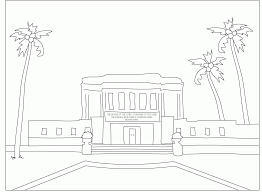John 7:14 – About the middle of the feast Jesus went up into the temple and began teaching.
Having quietly slipped by the people and religious leaders, Jesus was now present in the temple.

Because of the feast, there was a large multitude assembled in and around the temple. This would have been a very favorable time for Jesus to teach the people about the kingdom of heaven.
Although we don't know exactly what Jesus taught that day, we do know that he most often used ordinary images to explain spiritual truths. That being the case, it is likely that he taught spiritual truths/principles associated with the Feast of Tabernacles/Booths.
In particular, he may have included doctrine about mankind being in a spiritual sojourn on earth; if we want to possess the 'Promised Land' of salvation, we need to accept Jesus as the ultimate sacrificial lamb.
He probably also used the theme of harvest to explain how God will use us to assist in gathering a great harvest of souls for the kingdom of heaven.
John 7:15 – The Jews therefore marveled, saying, "How is it that this man has learning, when he has never studied?"
The teaching of the religious leaders of that day had been corrupted. They twisted religion into something that was a burden to the people, instead of a blessing.
On the other hand, Jesus taught pure, life-giving doctrines with simple clarity, straightforward reasoning and, no doubt, elegance of expression. His living words were a joy to the people.

At the same time, his teaching astonished the rulers of the temple. They couldn't fathom how Jesus had gained such a thorough understanding of the Old Testament scriptures and Jewish traditions, as he had never earned a 'degree' by studying the law with the scribes. His training from youth had been as a blue collar worker - a carpenter.
Jesus' understanding of the scriptures should have been a further proof to the religious community that he was the Messiah. But instead, these men were inflamed with jealously against him.
John 7:16 – So Jesus answered them, "My teaching is not mine, but his who sent me."
Jesus knows how the minds of the leaders work. They would reason that if Jesus was not teaching doctrine learned from the Scribes and elders, then he was making up a doctrine of his own. Obviously, this would be condemned by the Jews as heresy/blasphemy. It would provide them with a good reason to kill Jesus.
But Jesus confronts that controversy before they even voice it. His doctrine didn't come from the scribes, but it didn't come from himself either – it came directly from Father God. In his role as the Messiah, Jesus is a messenger, delivering the word of God to mankind.

Ask yourself this� Why did God allow Jesus to be raised and trained as a carpenter, instead of having him attend the school of the Scribes?
Could it be because non-religious training draws even more/greater attention to the source/origin of the gospel? Jesus was considered uneducated in his day; there is no way he should have possessed more than a common, rudimentary understanding of scripture.
Yet, he is pouring forth astonishing truth to all the people. The gospel message is unlike anything they have ever heard. This bears witness to the fact that his teaching was not his own, nor did it come from any man. It could only have come directly from Father God to Jesus, who would then reveal it to the world.
If that is true, then Jesus MUST be the Messiah; God has commissioned him to reveal spiritual truths:
Isaiah 11:1-2 - And there shall come forth a rod out of the stem of Jesse, and a Branch shall grow out of his roots: And the spirit of the LORD shall rest upon him, the spirit of wisdom and understanding, the spirit of counsel and might, the spirit of knowledge and of the fear of the LORD�
Interestingly, Jesus selects a group of uneducated men (fishermen, zealots, tax collectors, etc) to be the apostles. Later, the religious leaders will be astonished at their teaching and understanding of spiritual truths as well (Acts 4:13). Again, this is proof that the doctrines being taught are not those of man, but of God.
John 7:17 – "If anyone's will is to do God's will, he will know whether the teaching is from God or whether I am speaking on my own authority."
Again, Jesus addresses objections before they are even raised by his adversaries.
The people who are inclined to reject the teaching of Jesus would probably raise an objection similar to this: 'You claim to be sent from God, but we have no way of knowing that you are here on his behalf. Why should we believe you are teaching the commands of God?'

Jesus replies that sound judgment flows from a fear or reverence of God. If the hearts and minds of the Jews are fully set on the performance of God's true will, something within their spirits will confirm that his doctrine is true. That 'something' is a nudge of confirmation from Holy Spirit, who knows the mind of God (I Corinthians 2:10-13).
This holds true not just for the Jews of that day, but for 'anyone' - including people alive today.
This is of great benefit to us as believers. If we are unsure about the teaching of someone, we can ask Holy Spirit for advice. He will guide us into all truth (John 16:13) and illuminate our path so that we can confidently remain on the road of righteousness.
John 7:18 – "The one who speaks on his own authority seeks his own glory; but the one who seeks the glory of him who sent him is true, and in him there is no falsehood."
Further proof/confirmation can be found in the outcome of the teaching.
Any teaching which promotes or results in the earthly glory/honor/praise of the speaker while obscuring the glory of God is false. It has originated from the mind and authority of man and it ought to be firmly rejected by everyone who hears it. The true children of God will immediately recognize such a teacher as an imposter. Again, if there is any question, Holy Spirit will reveal the truth you.
Any teaching which results in the glory of God alone is holy and divine. In other words, if the natural outcome of the teaching causes the hearer to love the Lord God with all of his heart, soul, mind and strength and to love his neighbor as himself, then it is a true teaching. It should be followed closely, for it is the command of God.

In this passage, Jesus is specifically comparing himself with the professional teachers (Scribes, lawyers, Pharisees) of his day. They were full of pride in their knowledge of the scriptures. They regarded teaching as a privilege exclusive to their little group and they sought to gain honor and glory from their position.
By contrast, Jesus sought only the glory of the One who sent him to earth. He submitted his own will to the will of the Father, and taught only what the Father expressly desired. For this reason, there was no possibility of unrighteousness being found in him. The people could safely believe all that he revealed to them from the Father.
John 7:19 – "Has not Moses given you the law? Yet none of you keeps the law. Why do you seek to kill me?"
It would seem likely that after the statement of Jesus in verse 18, the religious leaders would have made some rebuttal statement, which John has not recorded for us. We already know they were publicly branding Jesus as a deceiver of the people (John 7:12), and they probably reiterated those false accusations at this time.

They are basing this calumny on the assumption that Jesus was not an exact observer of the law, because he had healed a man (the paralytic of chapter five) on the Sabbath. In fact, their hatred and opposition to Jesus really took off after the healing and subsequent teachings of chapter five.
Their logic goes something like this: Since Jesus healed on the Sabbath, he is a violator of the law, which automatically makes him a false prophet. Because he is a false prophet, he is a deceiver of the people. Both of these accusations carry the death penalty, according to the law (Exodus 31:14, Deuteronomy 13:5).
But notice, if you will, how the actions of the Jews perfectly prove the words/teaching of Jesus:�
According to Jesus, if any person has an earnest desire to know/accomplish God's will, Holy Spirit will nudge their hearts and confirm that Jesus was giving them sound teaching. Furthermore, they can be sure his teaching is true because it results in the glory of Father God, not his own personal glory.
Since the Jews have branded Jesus a deceiver and they want to kill him, we can conclude they do not have the desire to know God's will.

Instead, they wanted to rely on the law as given by Moses. This is where we see the final irony – this confrontation takes place during the Feast of Booths/Tabernacles. Moses mandated that the entirety of the law must be read during this feast as a reminder to the Jews to keep the law (Deuteronomy 31:10). Tradition says it was customary to read Deuteronomy 1:1-6:3 first. Within that very section of the law was the command 'Do not kill'. But right at that very moment, they were plotting to murder Jesus. This means that in their hearts they were planning to kill Jesus while being present at the feast and professing their commitment to keep the law!
John 7:20 – The crowd answered, "You have a demon! Who is seeking to kill you?"
It was a common belief among the Jews that when people have lost all common sense and reason, they are being tormented by the devil or they are under demonic influence/possession. If that is the case, we could say that many people here in the United States have a demon!
We see a lack of sound judgment and common sense all around us. Where does it stem from? It is the direct result of abandoning the righteous laws of God and rebelling against his authority. Scripture warns that those who do so will eventually lose the ability to determine right from wrong, and they will make decisions which are bad for themselves and others:
Romans 1:28 - And even as they did not like to retain God in their knowledge, God gave them over to a reprobate mind, to do those things which are not convenient;
In Romans 1:29-31, Paul goes on to list a great number of symptoms found in those who disregard the laws of God. Go ahead and look it up for yourself – it is an exact picture of what we see in our nation today. It is the headline in any and every news story of our time! I want you to notice one description in particular, found in verse 31:
Romans 1:31 - Without understanding, covenant breakers, without natural affection, implacable, unmerciful:
Paul plainly states that those who abandon the righteous laws of God are "without understanding". In other words, they make foolish decisions, which result in harm and detriment to themselves and others.
This is a very simple concept. The laws of God bring life into our lives. The closer we live to the righteous laws of God, the better decisions we make and the better off we will be. Our idea of 'common sense' will be in harmony with God's righteousness.
However, if we abandon the laws of God, we are left with nothing but our own reprobate minds which have been corrupted by sin and death.
Proverbs 16:25 - There is a way that seemeth right unto a man, but the end thereof are the ways of death.
The closer we live to our own (aka Satan's) laws, the worse off we will be because this can only result in bringing death into our lives.� Our version of 'common sense' will match Satan's version, and our decisions will bring further death and destruction to ourselves and our nation.
Can this be reversed?� If so, how?
I believe this can be reversed, but it won't be easy. First of all, there must be a great revival in the land, which awakens the hearts and minds of people to the principles of righteous living found in the word of God. People need to firmly believe in absolute truth as well as right and wrong as defined by God. Only then can we make decisions that breathe life into our earthly existence.
Secondly, people must be willing to renew/conform their thoughts, desires and actions to those of God. The apostle Paul understood this; he encouraged all believers to renew their minds:
Romans 12:2 - And be not conformed to this world: but be ye transformed by the renewing of your mind, that ye may prove what is that good, and acceptable, and perfect, will of God.
Thirdly, we who are already in the kingdom of heaven MUST commit to a holy way of living. For a long time now it has been almost impossible to determine who is in the world and who is in the church, because there isn't much of a difference between the two. How sad! If we want to be the salt and light of the world, we must be different from the children of darkness.
As we return our focus to the situation of Jesus at the temple, we again notice that the 'crowd' asks Jesus if he has a devil, because he thinks someone is trying to kill him. Their comment can be explained in one of two ways:

- The 'crowd' or common people present in the temple may be truly ignorant of the plot to kill Christ, which is why they deny it.� This is entirely possible because the majority of the people attending the feast live outside of Jerusalem.� In this pre-social media age, news of the assassination plot may not have been widely known.� Therefore, they think Jesus is being paranoid when he says there is a plot to kill him.�
- The religious leaders publicly deny their true intentions and support the idea of Jesus being mentally unstable, in order to cast further doubt upon his ministry.� If they fail in their quest to kill him, the second best outcome is to ruin his credibility among the people, so no one will follow him.
John 7:21 – Jesus answered them, "I did one work, and you all marvel at it."
In verses 21-24, Jesus gives proof that he is not guilty of breaking the law as they claim.
Think of him as a lawyer presenting his own defense. He begins the case by entering the attitude of the Jews into the record. They 'marvel' at the healing of the paralytic man at the pool of Bethesda (house of Mercy) and Jesus' subsequent command for him to carry his bed.
Specifically, 'marvel' means surprise and displeasure. Rather than being grateful to God for his mercy, they were consumed by astonishment that the healing (and the carrying of the bed) were done on the Sabbath. They considered these actions a violation of the Law of Moses (Leviticus 23:3).
John 7:22 – "Moses gave you circumcision (not that it is from Moses, but from the fathers), and you circumcise a man on the Sabbath."
The Jews always credit Moses for handing down the law, but not all of the law originated with him. Specifically, circumcision was instituted long before Moses; it began under the patriarchs Abraham, Isaac and Jacob (the fathers). Jesus reminds the 'court' that Moses was not appointing circumcision as a new institution, he was merely incorporating it into his collection of laws.
Jesus has been accused of violating the Sabbath. He now goes on to lay out the defense's case, beginning with two common examples from the lives of the Jews – circumcision and the Sabbath.

The Jews had been commanded to circumcise their male children on the eighth day of life. But they had also been commanded not to do any work on the Sabbath. So what should the people do when the time to circumcise a child fell on the Sabbath? Which law should prevail?
The reasoning commonly appropriated by all rabbis (including those now opposing Jesus), came from the school of Hillel the Great. This reasoning concluded that a positive injunction (do this) always took precedence over a negative injunction (don't do this) when the two coincided.
Circumcision was a positive command (do this on the eighth day), while observing the Sabbath was a negative command (don't do work, etc on the Sabbath). Therefore, the rabbis concluded that Jewish male children should be circumcised on the eighth day, even if it was the Sabbath.
Consequently, Jewish males were ALWAYS circumcised on the eighth day of life (Genesis 17:10-11). Period. No exceptions. Again, if the eighth day fell on a Sabbath, this work was still performed, since the law of circumcision was a positive law (do this) and positive laws to precedence over negative laws.
In other words, because it was commanded by God to circumcise on the eighth day, then doing so could not be a breach or violation of the Sabbath.
In fact, the opposite was true.� From this (and other instances), it is evident that keeping the Sabbath, even in the strictest sense of the word, still allowed works of necessity and mercy to be done on it; and those who failed to perform such works on that day when given the opportunity were violators of every law founded on the principles of mercy and justice!� ���
John 7:23 – "If on the Sabbath a man receives circumcision, so that the Law of Moses may not be broken, are you angry with me because on the Sabbath I made a man's whole body well?"
Let's reiterate that one more time: Keeping the Sabbath not only allowed works of necessity and mercy to be done on it; those who failed to perform such works on that day when given the opportunity were violators of every law founded on the principles of mercy and justice.

If circumcision is allowed on the Sabbath, then why are the religious leaders so angry that Jesus completely restored a man on that day?� By their own interpretation of the law, Jesus had not only the opportunity but the duty to show mercy to the paralytic that day.
It should also be noted that when the Jews circumcised a child, it was a sign of the covenant between the Jews and the Lord. It was an assurance that God had not forgotten his people; he still watched over them and planned to bring about his plans for their lives.
In the same way, the healing of the paralytic showed that God had not forgotten his people. He saw the damage sin inflicted upon their lives. He had a plan to completely heal them – body, soul and spirit. Rather than being angry when this man was healed, the Jews should have been rejoicing that God was moving among them!
John 7:24 – "Do not judge by appearances, but judge with right judgment."
On the surface, it may appear to be a violation of the Sabbath to perform circumcision on that day. However, if one sets aside prejudice, partiality and pride and looks logically and honestly at the law, they will discover it is NOT a violation.

Likewise, it may appear to be a violation of the Sabbath to heal a man on that day, but it isn't. If the religious leaders would set aside their pride and their prejudice against Jesus, and impartially look at the facts, they would certainly arrive at the correct conclusion – healing a man is NOT a violation of the Sabbath.
If Jesus really were in a court room, he would have just won his case! Having successfully defended himself and his actions, he now gives a word of rebuke to the 'prosecutors' in this case – don't jump to conclusions; impartially examine a situation and render righteous/correct judgment!

What a profound lesson for all of us! If you have ever been in a situation where someone else judged you unjustly, you know how much that stings/wounds you. You certainly won't want to do that to anyone else.
So make sure you don't jump to conclusions after hearing or seeing only one side of a situation. Have the courage to respectfully ask the people involved to tell their side of the story. Examine their motivations. If the Jewish leaders had done that to Jesus, they could have avoided a public rebuke by Jesus. Perhaps, if they laid their pride aside, they could have been convicted by Holy Spirit and accepted Jesus as the Messiah.
Let me offer you some encouragement:
Sometimes it can be awkward to share the gospel message with people. If that is the case for you, why not do what Jesus did – he used common examples from daily life which mirrored spiritual truths.
In this case, he used the Feast of Booths to reveal hidden spiritual principles, such as our sojourn on earth or the great end time harvest of souls.
Think of some everyday conversations you have had recently. Using these common topics of conversation, can you think of a way to more easily introduce the gospel message? I bet you can! Let's try to make that connection more often.
Let me offer you some relief:
The religious leaders of that day were very intimidating. If you weren't fully educated according to their standards, you had no business being a spiritual teacher or leader in any capacity. They were reluctant to accept anything Jesus said based on the fact that he was a mere carpenter!
But let me offer you some relief – God doesn't require a man-made degree in order to use you effectively in his kingdom! If you have a right relationship with God, he will fill you with his Holy Spirit and give you power to witness, heal, teach and otherwise minister to both believers and non-believers.
That isn't to say that we shouldn't study and understand the scriptures (II Timothy 2:15). However, don't let the absence of a degree stop you from being used in ministry!
Let me offer you some strength:
It is vitally important that we make just judgments in every situation of life. In order to do so, we must set aside our pride and our personal prejudices. This can be a difficult thing to do, but unless we look at situations impartially in light of God's truth/law, we have no hope of making right judgments. Let's try to make it a habit not to jump to conclusions, but to examine every side of an issue before we make a judgment.
